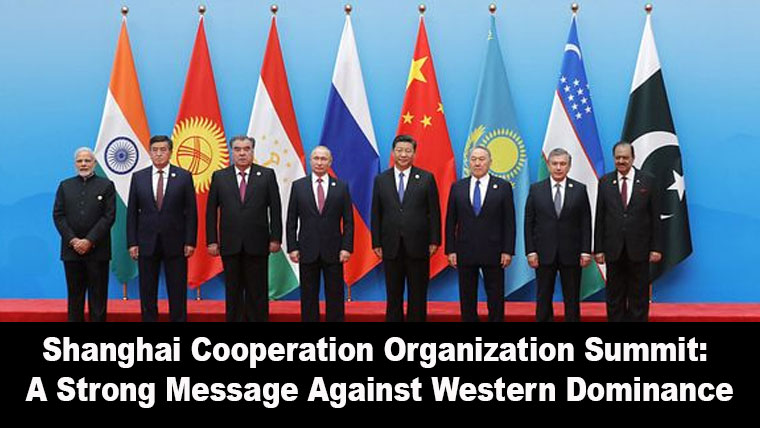Tianjin, China – The Shanghai Cooperation Organization (SCO) Summit concluded with a strong joint declaration emphasizing the strengthening of the global trading system, opposition to unilateral economic sanctions, and enhanced cooperation in the fields of digital economy and e-commerce.
The summit’s communiqué highlighted a unified stance against terrorism, separatism, and extremism, while reaffirming the implementation of the Counter-Terrorism Cooperation Program 2025–2027. The SCO also strongly condemned recent terror attacks in Pahalgam, Jaffar Express, and Khuzdar, and called for an immediate and sustainable ceasefire in Palestine, along with urgent humanitarian aid delivery.
A Turning Point in Global Power Politics
This year’s SCO Summit comes at a time of intense geopolitical rivalry, with major powers competing for political and economic dominance. The global trading system has been shaken by U.S. President Donald Trump’s tariff war, which has disrupted international markets. Against this backdrop, the SCO declaration carried a symbolic message: the era of exclusive U.S.-Western hegemony may be nearing its end, as emerging economies from the Global South position themselves as serious contenders for leadership in world affairs.
India’s Active Participation
One of the striking features of the summit was India’s unprecedentedly active participation. Though a permanent SCO member, India’s deep ties with the U.S. have often cast doubts on its role within the bloc. However, recent trade tensions with Washington—particularly the imposition of 50% tariffs on Indian goods by the U.S.—have strained relations.
In response, India has shown a noticeable shift by engaging more closely with China and Russia at the SCO platform. Indian Prime Minister Narendra Modi held separate high-level meetings with Chinese President Xi Jinping and Russian President Vladimir Putin, signaling the possibility of new alignments in Asia’s political economy.
Global observers suggest that Trump’s aggressive tariff policies have inadvertently pushed India closer to China, offering Beijing a vast new market and reshaping regional dynamics. Should China, India, and Russia succeed in expanding their trilateral trade, they could pose a formidable challenge to U.S. economic supremacy and potentially redefine the global balance of power.
Pakistan’s Delicate Balancing Act
For Pakistan, the summit carries equally important implications. While Pakistan enjoys close strategic ties with China, it also seeks to maintain stable relations with the U.S. Balancing both giants, however, remains a complex challenge.
Analysts caution that Washington’s goodwill toward Islamabad may be a temporary strategic tool, aimed at pressuring India and pulling Pakistan away from Beijing. Pakistan, they argue, must not compromise on its long-standing partnership with China, particularly regarding the China-Pakistan Economic Corridor (CPEC), which remains central to its economic future.
The Broader Message
The SCO summit’s declaration reflects an emerging alternative global leadership, one that rejects unilateralism and embraces multipolar cooperation. For South Asian states, especially Pakistan, this offers both opportunities and challenges. The message from Tianjin is clear: the Global South is no longer a silent observer but an active participant shaping the world’s political and economic future.



